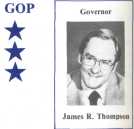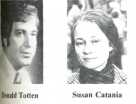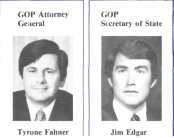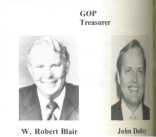 |
Home | Search | Browse | About IPO | Staff | Links |
 |
Home | Search | Browse | About IPO | Staff | Links |
|
By AL MANNING Thompson and Stevenson write their tickets FRED LUNDIN was a wheeler-dealer, a behind-the-scenes political power who served as the key operative for governors and other elected officials in the 1920s. A kingmaker. A political strategist. He could even make or break presidential candidates. According to legend, Lundin, who called himself the "poor Swede," was having a drink in a Lake County saloon with some of his cronies one day when they began arguing politics. Lundin said he could elect anyone to state office. "Anyone?" the other politicos asked. "ANYONE," he bragged. The bet was placed: The first person through the door would be elected to state office. And in walked a young man carting a block of ice whose father farmed near Lundin. His name? William J. Stratton. Today in Illinois politics, there is no longer a nonelected official who would have the presumption to place a bet like Lundin's. For the 1982 election, it was the gubernatorial candidate of each political party who played the key role in choosing the candidates for the other state offices. But the Democratic party went through an elaborate process involving hundreds of people and a formal vote of 24 in an open meeting. The Republican party, trying to avoid the slatemaking image, encouraged interested candidates to run in the primary election to allow the voters some choice. As a result, the Republicans have contested primaries for two state offices: lieutenant governor and treasurer. The Democrats picked their candidates in November and have no battles in the March primary. Thompson's choices Republican Gov. James R. Thompson said all along he would seek a third term, and he had half the GOP ticket lined up by the end of 1980. He had appointed Tyrone Fahner as attorney general when William J. Scott vacated the office, and then appointed Jim Edgar secretary of state when Alan Dixon resigned to take his seat as U.S. senator. Both men promised they would run in 1982, and they are — unopposed. Thompson's choice for lieutenant governor is House Speaker George Ryan, but two other Republican legislators also want the nomination: Sen. Donald Totten of Hoffman Estates and Rep. Susan Catania of Chicago. Thompson's hand-picked candidate for comptroller is former Rep. Calvin Skinner; Chicago businessman Robert Hall withdrew January 29. Thompson stayed neutral in only one race — treasurer — in which former House Speaker W. Robert Blair and Peoria businessman John Dailey are seeking the nomination. The problem for the Republicans was that everybody, it seemed, wanted to run for lieutenant governor and nobody for comptroller. Thompson's two-time running mate for lieutenant governor, Dave O'Neal, had resigned a year before, denouncing the office as "do-nothing." But Totten wanted the office, despite his sometimes pointed criticism of Thompson. Then there were state Sen. Prescott Bloom of Peoria and Rep. Herb Huskey of Oak Lawn. Finally, on August 30, Thompson announced that his choice was Ryan, but the endorsement didn't discourage Totten from running, and since both men were opponents of the Equal Rights Amendment, Rep. Catania decided to run against them. But there was no GOP heavyweight who wanted to run for comptroller. The problem, it seems, was raising enough campaign funds for the ultimate race in the November election against Democratic incumbent Roland Burris. Hall, a businessman who had unsuccessfully sought a seat on the Metropolitan Sanitary District Board, was the only announced candidate that stayed with it through the official filing period. But Republicans evidently felt they were without a satisfactory candi-date, so Thompson phoned Skinner Earlier, Skinner had told the govenor he would be available if the party needed someone to discuss economic issues intelligently. Skinner, 39, was in the midst of preparing for a comeback to the state legislature after losing his 1980 primary attempt to oust U.S. Rep. Robert McClory of Lake Bluff. When Thompson called, Skinner said yes, he would run for comptroller. The Republicans without opposition on the statewide primary ballot are Thompson, Fahner, Edgar and Skinner. But Thompson could head a ticket in November with some Republicans who have sometimes opposed him, namely Totten for lieutenant governor and Blair for treasurer. Stevenson's slate   While Thompson was assembling his ticket, Adlai E. Stevenson III was doing his own political footwork. Although Stevenson was unopposed on the day of slatemaking, earlier in the year the Democrats had not been certain who would carry their banner for governor. Most political observers figured Stevenson wanted to be drafted, yet he stood before the Lin-coin Academy May 9 in Springfield and said: "I don't expect to seek public office in Illinois again."   
16/March 1982/Illinois Issues 
Somewhere along the line, Stevenson decided to run, and just days before slatemaking he decided who he wanted to run with him. The Democrats' endorsement of incumbent Comptroller Roland Burris, the first black state official, was never in doubt, and Treasurer Jerome Cosentino seemed to lock up the secretary of state endorsement early. But three of Stevenson's picks were complete surprises: Grace Mary Stern for lieutenant governor; former Lt. Gov. Neil Hartigan for attorney general; and a downstater, state sen. James Donnewald, for treasurer. He interviewed possible candidates for lieutenant governor the week of November 8, and he chose Stern, an affable woman of 56 serving her third term as Lake County clerk. A Chicago newspaper column reported Stevenson chose her on the advice of his wife, Nancy. "I resent the suggestion that only women can support other women," said Mrs. Stevenson after the slating of Mrs. Stern. "We've long dropped that notion. I'm not a power behind the throne." Stevenson chipped in:"The idea that Nancy made the decision is fiction." But he quickly added: "But she is an enthusiastic supporter of Grace Mary's." Before Stevenson announced his selection of Stern, he phoned Hartigan and asked if he would be interested in running for attorney general. "He seemed surprised," Stevenson said. Hartigan, 43, has been vice president of the First National Bank of Chicago for the past five years, and he has also been in opposition to Mayor Jane Byrne. Meanwhile Stevenson knew he had to have a downstater for treasurer to offer some semblance of geographical balance to the ticket. Downstaters were interested, including Rep. Gerald Bradley of Bloomington, who didn't give up until the final day of slatemaking. But Stevenson wanted Sen. Donnewald of Breese, who only let it be known a week before slatemaking that he might present his credentials. Stevenson, after consulting with Senate President Phil Rock, reached Donnewald on a hunting trip in southern Illinois to make certain he would seek the party endorsement. By the time State Chairman John Touhy gaveled the meeting of the 24-member Democratic State Central Committee to order November 16, the deals had been struck and the ticket set. The Springfield Hilton, a modern 30-story structure with an open, airy ballroom which allows reporters to roam freely about, offered a sharp contrast to the infamous St. Nicholas Hotel a few blocks away, the hotel where reporters used to eavesdrop through transoms while Democratic lawmakers met in secret. Touhy, a silver-haired Chicagoan who served as speaker of the House after Paul Powell, was anointed state chairman by Chicago Mayor Richard J. Daley in 1973. Touhy delivered a broadside against the Republican party — the first of 32 political speeches which would be delivered in the room in four hours. Stevenson was the first of the candidates to speak; he talked about revitalizing the state's economy and criticized Thompson for supporting Reagan administration policies that shift responsibility for social welfare to the states. Stevenson, who resembles his late father in both style and appearance, recalled his father's term as governor. "State government hasn't been so politicized since Dwight Green was governor," he said. "I intend to clean up after Thompson like my father cleaned up after Green." Few in the crowd seemed to know or care that, barring a scandal in the next year, the Thompson administration has a much better record on governmental ethics than did the Green administration. Stevenson did manage to cause a minor flap during a question and answer period following his speech when he called for stricter regulation of handguns. "Handguns are easily accessible," he said in response to a question about crime from state Rep. Wyvetter Younge (D., East St. Louis). "I'm a hunter, but I don't shoot with a snub-nosed 38. We ought to do what other civilized countries do. It's elementary, the easiest first step. We should keep handguns out of the hands of children, criminals and the mentally retarded. With some courage, we could be doing that." Two days later in Chiago reporters would ask if he didn't commit political suicide because of the controversial nature of the issue, particularly downstate. The candidate assured them he had not. Despite his unspectacular style, Stevenson seems to have the same degree of success with the backroom politicians as he does with the voters. Although he doesn't quite fit in with the ward heelers, he was successful enough in his unorthodox campaign for the endorsement that his chief rival, former Gov. Dan Walker, didn't even bother to attend the slatemaking meeting. Walker had announced his withdrawal from the race before the slatemakers met. March 1982/Illinois Issues/17 Stern delivered an energetic speech to the slatemakers, many of whom were hearing her for the first time. The Lake County clerk (who had tried four years ago to be slated) told the crowd: "I believe I can serve the governor as ombudsman, as liaison to local government, as one who will take on ad hoc projects suggested by him. Whatever the governor has in mind for his management team, for his lieutenant, I stand ready to contribute my thoughts and my energies and the force of my office to their realization."
Before delivering his speech, Cosentino, 50, of Palos Heights, had locked up the endorsement for secretary of state, which was in his best interest because the committee certainly would not have voted for him based on the strength of his monologue. He made peace with Chicago Mayor Byrne, whom he had earlier called the "snow-flake queen," and with the Italian-American community, an important constitutency which had felt snubbed by him. Cosentino did have opposition for over a year from Calvin Sutker of Skokie, a lawyer and a member of the Democratic National Committee, who raised a considerable amount of campaign money in the process. But when it came time for Sutker to speak, all he could do was announce his withdrawal. There was at least a modicum of interest in the presentations for attorney general since most party leaders were not aware that Hartigan was even going to be there until reading about it in the newspapers over the weekend, and others had announced much earlier. He was asked why he waited so long to make known his intentions. "I had very serious political considerations," he replied. "I didn't want to sit on the sidelines. ... As you recall, I was the youngest elected and the youngest retired [lieutenant governor]. I said I would be back." The others seeking the nominations went through the motions: Chicago Alderman Martin Oberman, Rep. Daniel M. Pierce of Highland Park, Rep. Clarence Darrow of Rock Island, Sanitary District Commissioner Chester Majewski of Chicago and Alex Seith, who originally tried for governor. By the time incumbent Burris spoke for reelection, and Rep. Bradley and Sen. Donnewald made their speeches for treasurer, the large room was nearly empty. Few in the crowd had the stamina of the 66-year-old Touhy. He kept the meeting rolling right through the lunch hour without even a break for the washroom. The day ended with everyone knowing who was running for what, but the official vote on the slate took place two days later, November 18, in Chicago at the Bismarck Hotel. Michael Howlett, who had held court earlier that day in the Walnut Room (the famous gathering spot for important Democratic politicians), was introduced by Touhy as "the person who knows more people by their first name than anyone else in the state." The former secretary of state and gubernatorial candidate set the tone for the meeting by criticizing Thompson and the Republicans: "The Republican party is interested only in the bottom line. The Democratic party is interested in the bread line, too, and the grocery store line and the unemployment line and the line of young families who can't afford to buy a house." Stevenson droned through another speech, but the partisan crowd seemed interested. Committeeman Bill Morris, mayor of Waukegan, answered a ringing phone as he tried to join his colleagues in the front of the room. "I don't know where he is," Morris shouted into the mouthpiece. "There are about 400 people in this room, and it's so crowded you can't even go to the bathroom." But Chicago Alderman Roman Pucinski noted the absence of most influential labor leaders, a group which traditionally attends and supports the Democratic gubernatorial candidate. Stevenson discounted the significance of their absence by pointing out they were attending a national convention in New York. But he also acknowledged he wasn't likely to win the support of the Teamsters. Although the Stevenson-Stern endorsement was not in doubt, a group of downstate committeemen, irritated at Touhy's handling of the meeting, decided to challenge the chairman early. They didn't object when Gary Marinaro was appointed to the committee to replace Sal Pullia (because Pulia had been missing six months and was believed to be the victim of foul play But they did object to the appointment of state Rep. Ted Lechowicz of Chicago as a replacement for Michael Hagapian who was ill. Touhy, once known for a fiery temper, overruled their first objection, but then relented and allowed a roll call on the seating of Lechowicz. The members voted 12-11 against Lechowicz, but since votes are cast on a weighted system based on the number of votes in the 1978 Democratic primary election, Touhy (who was presiding over his last slatemaking session before retiring won. This showed once again the strength of Chicago Democrats versus the relatively unimportant downstate contingent. The rump group, con-sisting mostly of Bradley supporters, realized it was a lost cause, and Bradley withdrew in favor of Donnewald. So, the official Democratic slate was set, and the entire slatemaking session and endorsement process never felt a ripple of turbulence from Mayor Byrne. Lackluster primary Instead of a fierce Democratic primary as some had expected, it's the Republicans who will battle it out on March 16. The three-way campaign for the GOP nomination for lieutenant governor promises to be the highlight of an otherwise lackluster primary season. Although lieutenant governor candidates seldom play a pivotal role in the general election, the outcome of the primary could have a bearing on Thompson's reelection chances in November. Oh, yes. Power broker Lundin won his bet. Luckily, for him, the iceman also had a sense of public service, A game warden at the time, Stratton was involved in school board affairs and he was a Republican precinct committee-man. Lundin arranged for him to be appointed the first director of the new state Department of Conservation, and then got him elected secretary of state. in 1928. His son, William G. Stratton, served as a member of Congress, state treasurer and governor from 1953-61. □ AI Manning is a political columnist for The State Journal-Register, Springfield. 18/March 1982/Illinois Issues |